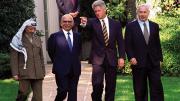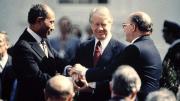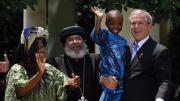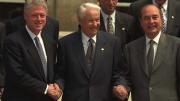Diplomacy has never been so important as now, when we are confronting the most serious crises since the Second World War: the global pandemic and economic collapse.
When we emerge finally from the grip of the coronavirus, Americans will need to account for a public-health disaster that has killed well over 100,000 people to date and shuttered nearly every institution in our society (including Harvard) for much of the spring and into the summer.
But we’ll also need to look beyond our borders to assess what went wrong globally. Why did the World Health Organization—its long and continuing record of expertise in matters of global health notwithstanding—not press China more aggressively to tell the truth about the virus in early January? How should nations be better prepared for a possible second wave? Can they agree to share a vaccine equitably among the world’s 7.7 billion people? Will the major economies collaborate to prevent the current recession from turning into another Great Depression? The answer to these questions will depend in large measure on our ability to work diplomatically across the world in this multi-front struggle.
As a former career Foreign Service officer, I have spent four decades of my professional life representing the United States overseas and teaching about America’s role as the indispensable power in the international arena. For much of that time, the nation leaned heavily on its unmatched military might—during the Cold War, after 9/11, and in the Afghan and Iraq wars. Now, with the spread of the coronavirus to every inhabited continent, diplomacy’s time has come in the reconstruction of a more stable and better world.
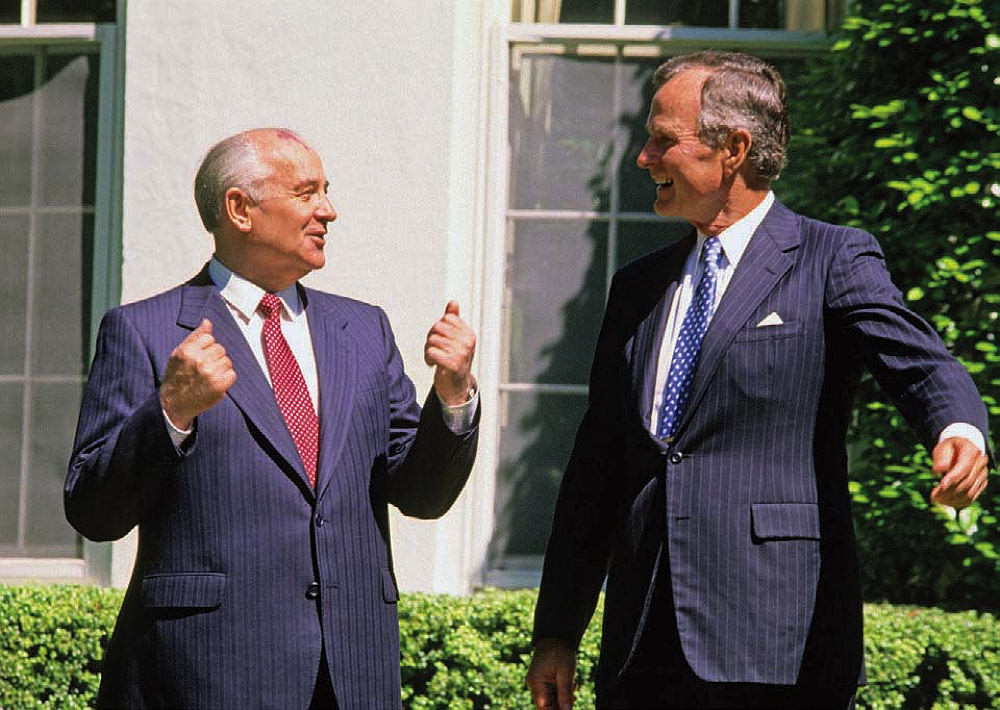
Mikhail Gorbachev and George H.W. Bush, May 31, 1990, the White House
Photograph by Ron Sachs/CNP/Getty Images
Unfortunately, restoring the role of U.S. diplomacy won’t be easy. One early casualty of the pandemic is our plummeting credibility as the unmatched global power. For the first time since World War II, America has chosen not to lead in confronting a quintessentially global threat. With American energy and confidence in short supply, President Donald Trump is a spectral figure on the world stage as nations struggle to contain the virus. Instead of leading the G-20 major economies against the contagion, the world has watched an American president castigate China for birthing the “Wuhan Virus,” pin the blame for the failed response on the World Health Organization, and—as one of my European students lamented—fail even to offer a simple word of sympathy in all those endless news conferences to those dying in Italy and Spain and other bedrock allies.
Former Secretary of State Colin Powell has long maintained that America should place its diplomats out in front (“on point” in the military vernacular), with the armed forces in reserve, to be used only when diplomacy fails. Powell’s dictum is an important reminder of how the United States should seek to lead in this time of pandemic, for the coronavirus is only one of many among a new type of threat that requires us to lead as much through the power of diplomacy as through that of the military.
Many of the students I teach point to transnational threats that affect every nation and person on earth as our greatest challenges: climate change, food and water shortages, narcotics and crime cartels, the lack of cyber security, and pandemics top the list. We cannot succeed in containing them without forming diplomatic alliances among governments, universities, foundations, businesses, and citizens.
This new brand of diplomacy is not an alternative to the military but its logical partner in the twenty-first century American arsenal. The military remains essential to fight terrorists, and to counter rivals Russia and China and outlaw governments in North Korea and Iran, but even in these cases we have to have robust diplomacy to achieve our aims. Even if we deployed the full might of the U.S. military to eliminate the North Korean and Iranian nuclear programs, and the regimes that support them, does anyone believe that would, by itself, “solve” the problem? Even in those cases, deft, multilateral diplomacy will have to play a lead role—as recent experience has shown. We can no longer default to force alone, as we have done so often since 9/11.
A Foreign Service for 2030
America’s diplomatic effectiveness rests, in large part, on the women and men of the U.S. Foreign Service—more than 11,000 career officials in more than 280 embassies and consulates and at the State Department in Washington, D.C.
They are our primary interface with foreign governments, businesses, and citizens. They adjudicate immigrant and non-immigrant visas and refugee admissions to the United States. They help American businesses overcome barriers to foreign trade and investment. They manage difficult war and peace challenges in every corner of the world—from daily challenges to the most intricate, strategic matters vital to our national security and prosperity. Diplomatic collaboration also underpins our ability to advance the more positive scientific, technological, and societal trends that can sustain the historic alleviation of poverty worldwide, promote women’s rights, and realize the promise of a carbon-free economy.
Just when we need to turn to diplomacy, however, the Foreign Service is experiencing one of the greatest crises in its long history. Some of the damage has been caused by prior Democratic as well as Republican administrations. The United States is the only major country that fills a third or more of its ambassadorial assignments with political appointees, often poorly qualified, from outside the career ranks—often depriving the country of the advantages it could secure with expert, professional, nonpartisan diplomatic representation around the world. That mistake has only accelerated, with the current administration appointing the lowest percentage of career ambassadors in more than half a century. Former generals and admirals have been appointed to ambassadorships that would otherwise be filled—as they should be—by civilian officers. The politicization and militarization of our foreign policy by both parties is a genuine problem.
More broadly, the Foreign Service has been substantially weakened and is in need of major repair. Even as the Trump administration’s budget requests for the Department of Defense rose from $686 billion to as high as $718 billion during its first two years, it sought to slash the State Department’s budget by up to a third. The administration fired several of America’s most senior and experienced diplomats early in 2017 and sidelined countless others, triggering an exodus of officers of every rank. The president himself has castigated career diplomats as the “Deep State.” Unsurprisingly, morale has crashed and young Americans’ applications for the Foreign Service have fallen to just under 10,000 from a high of 31,000 in 2003—a worrisome indicator that our nation’s ability to attract superb diplomatic talent is being eroded.
Re-Imagining American Diplomacy
The Kennedy School launched an ambitious, nonpartisan initiative this winter—A New American Diplomacy for the 21st Century—to address these concerns and spark a national conversation about the future of the Foreign Service. I am working with former Foreign Service colleagues, Ambassadors Nancy McEldowney, Marc Grossman, and Marcie Ries, to issue a major public report after the November presidential election.
We have organized online meetings with hundreds of current and former officials, business and nonprofit leaders, and everyday citizens to discuss ways to strengthen the career service.
American diplomacy needs a major generational update. Since 9/11, Congress and three administrations have reformed the U.S. military and intelligence services and created the Department of Homeland Security. But collectively, they did little to re-imagine diplomacy’s role in the American arsenal.
During the last century, there have been just three efforts to modernize the U.S. diplomatic corps: in 1924, 1946, and 1980 (when Congress passed the last major State Department Authorization Act). In our vastly altered geo-strategic environment, 40 years later, it is time to renew the mission of the Foreign Service.
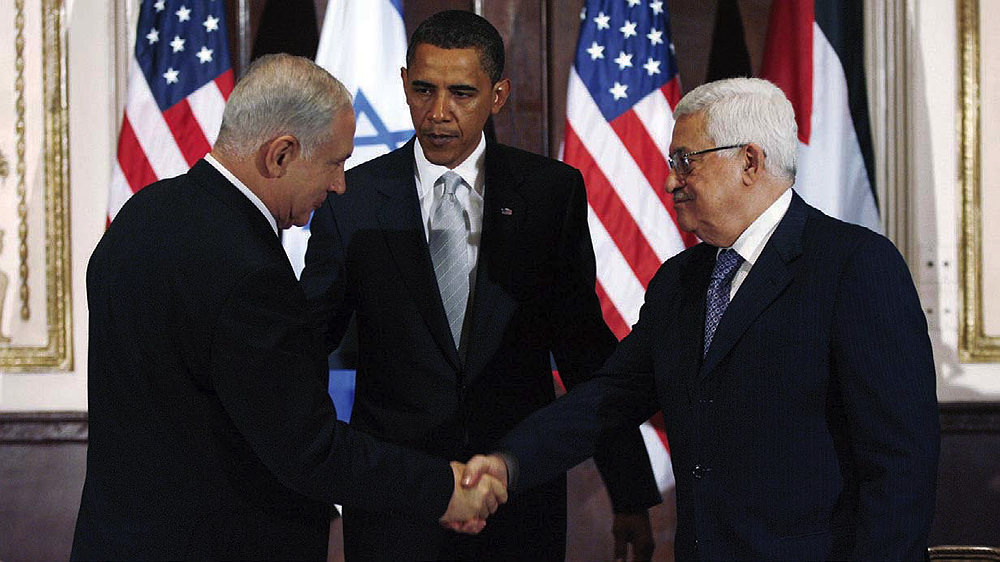
Barack Obama, Benjamin Netanyahu, and Mahmoud Abbas, September 22, 2009, at the Waldorf Astoria, New York City
Photograph by John Angelillo-Pool/Getty Images
We can mine America’s long diplomatic history for inspiration. Drawing on my own experience, I recall, as a young intern at the U.S. embassy in Mauritania, seeing first-hand the respect and influence President Jimmy Carter earned as the first U.S. leader to make Africa a priority. A decade later, when I served at the National Security Council with responsibility for the Soviet Union, I witnessed President George H.W. Bush negotiate the peaceful end of the Cold War and Bill Clinton consolidate the triumph of democracy over communism. President George W. Bush launched the bipartisan PEPFAR initiative to help in the fight against HIV/AIDs, polio, malaria, and other deadly diseases in Africa, the Caribbean, and elsewhere (a useful precedent when thinking about what it will really take to combat the coronavirus, not only in the developed nations, but in those with far fewer economic and healthcare resources).
It was on 9/11, however, as U.S. ambassador to the North Atlantic Treaty Organization, that I learned one of the most powerful lessons about diplomacy. Just a few hours after Al Qaida terrorists attacked the World Trade Center and Pentagon, my phone started to ring at NATO headquarters outside Brussels. My Canadian colleague, David Wright, called first—followed by the ambassadors of the United Kingdom, France, Poland, Germany, Italy, and many others. Each asked, “What can we do to help?” Those were very welcome words on the single darkest day in recent American history.
By the next morning, invoking Article 5 of the 1949 NATO Treaty for the first time in history, all of the NATO-allied countries came to the rescue of the United States—lending mighty political and diplomatic support to the military response that would come later. Our allies considered Osama Bin Laden’s attacks on New York and Washington as an attack on them as well. Their militaries all went into Afghanistan with us (the majority remain 19 years later—and they and other partner nations have suffered more than 1,000 combat deaths; we owe them a lot).
Contrary to such evidence, the current president believes the United States is strongest when it acts alone—unburdened of allies and partners whom he views as relics of our Cold War past.
I lived the history of 9/11 and draw a very different lesson about the value of allies to the United States. Why would we want to live alone in a troubled and dangerous world, without the benefit of friends and allies by our side?
Our NATO allies, as well as Japan, South Korea, and Australia, act as multipliers of American power in the world. They provide a lifeline of military, economic, and political support when we often need it most. They represent the great power differential between the United States and our rivals Russia and China, who can count on no such allies when the chips are down.
As we recover from two decades of war and COVID-19’s assault on our society and economy, we will need to look at our global role in a new way. The era when America could run the world by fiat has vanished. We are still the strongest economic, military, and technological power—but China, India, and others are gaining on us. We can no longer overpower our adversaries in every crisis. And although we will need to call on the military to defend us in the future, we will more often than not need to outwit and outmaneuver adversaries through the strength of our diplomats and our alliances—not to mention mustering support for those broader, nonmilitary crises we now face, from pandemics to climate change.
Uniting Diplomacy with American Values
My experience in government has also taught me that diplomacy is most effective when it is cemented in American values and the rule of law. That should lead us to stand up for democracy when it is threatened in NATO-allied countries such as Turkey and Hungary, and when human rights are assaulted in Russia and China.
My experience in government has taught me that diplomacy is most effective when it is cemented in American values and the rule of law.
When I interviewed former Secretary of Defense Jim Mattis a few months ago in Washington, he pointed to this foundational American strength. The United States exercises two great powers in the world, he said. The first is the “power of intimidation,” through our first-class military. But America has a second and more important power—the “power of inspiration” to the rest of the world, reflecting our nation’s democratic founding.
A Harvard audience heard a variation of this theme from Winston Churchill in Memorial Hall on September 6, 1943, when he received an honorary doctorate of laws from President James B. Conant. In a lyrical speech entitled, “The Gift of a Common Tongue,” Churchill urged his audience of deans, professors, and dignitaries—and in later remarks in nearby Tercentenary Theatre, more than 6,000 cadets training to go to war—to reject isolationism and accept the mantle of world leadership. At a time when the United States had surpassed the British empire as the most powerful global leader, Churchill’s speech was a metaphorical handing of a baton to the young Americans on the front lines of World War II.
“The price of greatness is responsibility,” he said. “One cannot rise to be in many ways the leading community in the civilized world without being involved in its problems, without being convulsed by its agonies and inspired by its causes.”
Churchill’s words at Harvard then are as vital and relevant to Americans today. Americans can author a better, more just, and peaceful era if we recall our responsibility to lead and to be a force, through diplomacy, for democratic values in an ever more complex and dangerous world.
